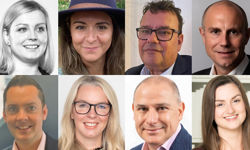
Diversity and inclusivity have been on many people’s minds this year. But for Andrea Thompson, editor-in-chief of Marie Claire UK, it is an issue close to her heart. As the daughter of a white mother and a black father, she has written recently of her acute awareness of racism from an early age. And diversity and inclusion are integral to the campaigning mindset she’s had throughout her publishing career.
Fascinated by other people’s stories for as long as she can remember, Thompson says that from a young age, journalism appealed as with her interest in politics always encouraged, her strong sense of social justice was developed early on.
“I grew up feeling that I wanted to amplify people’s voices you didn’t often hear in the media,” she explains.
Fast forward to today, and Thompson says that with Marie Claire’s campaigning ethos and global outlook – two things that have long characterised the women’s title which last year stopped print publishing in the UK to become digital-only – she is, perhaps, the brand’s living embodiment.
“Having an opinion and a stance on the big topical issues – driving and campaigning for gender equality and racial equality – is really at the heart of what we stand for as a brand and what I am hoping to help move forward today,” she adds.
It is therefore no coincidence that one of her recent major projects has been a Future of Work survey – produced in partnership by Marie Claire UK and LinkedIn – which, amongst other things, unpacks the unequal impact the pandemic crisis has had on working women and different ethnic groups.
And it is hardly surprising that now, as a BSME committee member, she is also eager to help promote positive action around the need for greater diversity and inclusivity in magazine publishing.
“For a very long time, there has been a real absence of role models within management in the media,” Thompson explains, harking back to her early career, which began, after a brief stint in book publishing, at Bauer then saw her join the features team at the Daily Mail followed by a brief stint in TV before arriving at Marie Claire UK as features director in 2009.
“When I was entering the industry, there just weren’t people that looked like me and I had a sense there was a way you had to be and a background you had to have to get on.”
When you look at media teams in the UK, they are still filled predominantly by a certain demographic.
Still work to be done
She adds: “We have made some great strides since, and there is a lot more diversity at the helm of publications. But there is still so much work to be done – when you look at media teams in the UK, they are still filled predominantly by a certain demographic.”
The key is to look at the ways publishers recruit and to cast the net wider, Thompson says: “Such as by doing outreach in schools, and by doing paid work experience initiatives that mean you’re not drawing from the same pool of talent that can afford to work for free, which in the past has always been the way.”
It’s also about recognising within organisations that there is a problem in the first place and that it needs to be tackled.
“At Marie Claire UK, we have tried very consistently to draw talent from a range of backgrounds. I have always been drawn to mentoring young women from socially and economically deprived backgrounds who might not have considered a career in the media industry,” she continues.
“Also important is putting in place systematic changes within our companies that ensure we can pull in and retain staff who are from different backgrounds.
“Generalisations about black people and comments about people from different backgrounds casually said in conversation – whether it’s about looks or presumptions made about education and background based on the colour of somebody’s skin – are still a great problem in our industry, however.”
Casual racism is something she’s experienced first-hand throughout her career. “Certain comments can make you feel like an outsider – even when you reach a certain point on the ladder,” Thompson admits. “And that can be really damaging to someone’s confidence.”
Wearing her BSME hat, Thompson says that she is looking forward to participating in education initiatives planned to boost social mobility and to provide opportunities for people from disadvantaged areas to break into journalism; not least as she sees this as critical for the long-term health of the industry which she loves.
“Greater diversity and inclusivity are really important because the future of magazines – and when I say ‘magazine’, I include digital media in a magazine format – very much depends on appealing to the widest possible audience,” she points out.
“And that means having subject matter and voices that reflect all of society, so people from across society carry on buying magazine products.”
The key is to look at the ways publishers recruit and to cast the net wider.

You can hear Andrea Thompson being interviewed by Ciar Byrne on a recent episode of The InPublishing Podcast, which was sponsored by Acorn Web Offset, the Yorkshire-based specialist A5 and A4 magazine printer.
This article was first published in InPublishing magazine. If you would like to be added to the free mailing list, please register here.












